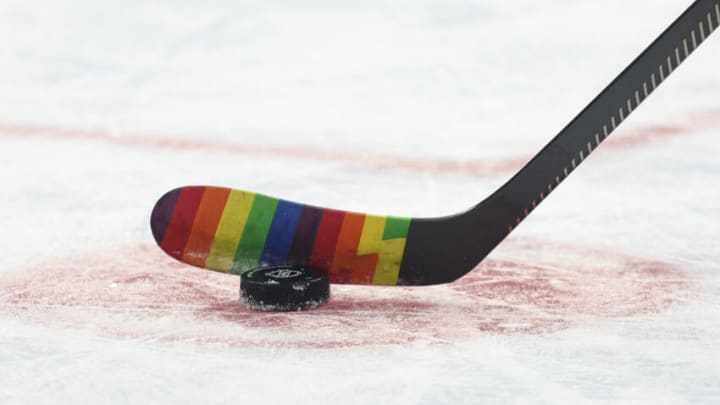According to a recent memo sent to NHL teams, players will no longer be allowed to use the rainbow Pride stick tape while on the ice for warmups, a game, or even in practice. The league has come under fire recently for their decision that is being used to protect those players who may outwardly speak out against it, such as what happened last season with Ivan Provorov and others. An avid supporter of the LGBTQ+ community, Flyers forward Scott Laughton has plans to use the tape regardless of its ban.
The league had previously banned speciality night jerseys altogether. Those included other jerseys such as Military Appreciation and even Hockey Fights Cancer. Now players will be unable to show their support at all on the ice, unless they decide to go against the NHL.
"“You’ll probably see me with the pride tape on that night,” Laughton said after Flyers practice on Wednesday. “I don’t know, I didn’t read really what it said, if it’s a ban or something, but I’ll probably have it on.”"
It’s no surprise that Laughton has been outspoken about his disappointment. He and former Flyers forward James van Riemsdyk came up with the Flyers Pride Initiative. The two donated four tickets to 12 different home games to members of the LGBTQ+ community. They would also host meet and greets after the game as well. Laughton also rose the Pride flag in front of the Wells Fargo Center back in the summer of 2022.
Laughton is not the only player to have spoken out recently about the league’s decision. Edmonton Oilers forward Connor McDavid, who is notoriously known for not speaking out, talked about the disappointment with the NHL’s ban of Pride tape. Others such as Toronto Maple Leafs forwards Zach Hyman and Morgan Reilly, and Minnesota Wild forward Jon Merrill have spoken out as well. This came after another memo was leaked, stating that players could choose to avoid interacting with certain group that could be brought in during these speciality nights. As teams begin to question whether or not players could then wear certain shirts or other items in support, the league later clarified this stance.
"“Players shall not be put in the position of having to demonstrate (or where they may be appearing to demonstrate) personal support for any Special Initiatives,” the previous memo stated. “A factor that may be considered in this regard includes, for example, whether a Player (or Players) is required to be in close proximity to any groups or individuals visibly or otherwise clearly associated with such Special Initiative(s).”"
What this means is that players are free to wear shirts or other items to support their causes, but teams cannot force anyone to participate in events as some may fear retribution or embarrassment if they decide not to. Instead of letting players choose what they want to do and how they can support, the league is instead catering to those very few who do not want to. And it’s the players who sat out or refused to wear the jersey that show how much something like Pride Nights are needed in the first place. It can be used to help educate and open up the conversation to hopefully lead to change and everyone being accepted for who they are one day.
"“Yeah, you have a handful of guys (who sat out last year), but that’s why you have those nights. It’s the education purpose of it, and it’s their decision,” Laughton said. “I think that’s another thing, people took it too far of blaming some people. That’s their decision (to not wear the jersey). But that’s why you have nights like that. If everyone wanted to wear it, then we probably wouldn’t have nights like that.”"
While Laughton was the first player to outwardly say that he plans on wearing the tape anyway, it’s likely that he won’t be the only one to do so. It’s then that we will truly see where the NHL stands. If enough players continue to show their support, the conversations can still continue and maybe one day, someone will feel safe enough to be who they truly are. Showing support in any way possible is the true goal in the end.
